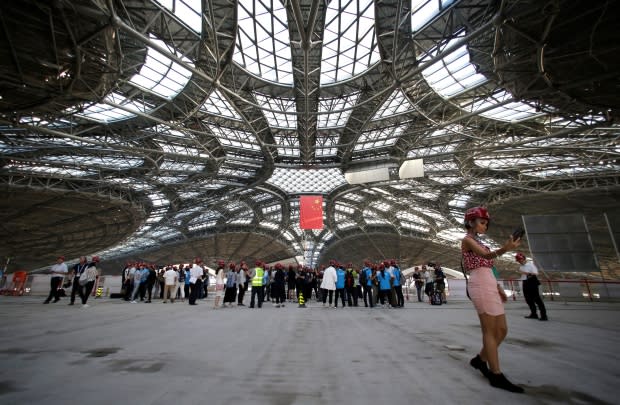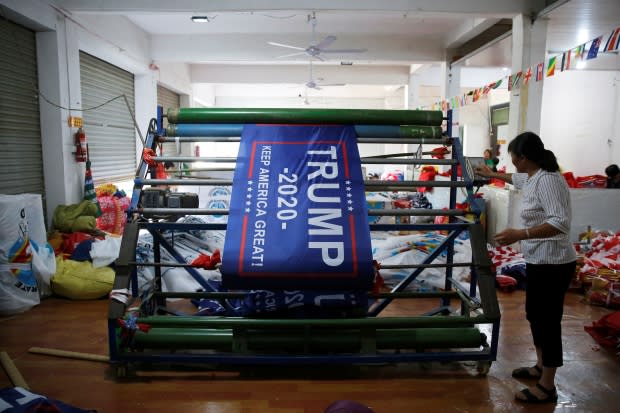Who wins a U.S.-China trade war? The one that loses least: Don Pittis
Who will win the escalating trade dispute between the United States and China? According to Canadian experts on China and trade, the only thing that's certain is that people in both countries would lose from a full-blown trade war.
Despite the dire consequences for each side, it is not entirely clear that either country will readily concede in what has become a global game of chicken.
One problem is that the trade battle is not simple.
U.S. President Donald Trump's mental image of an "out-of-control trade deficit" with China, as well as China's "theft" of U.S. technology, does not adequately describe what may actually be a battle for global economic supremacy.
Lines in the sand
Exactly how it will all end is far from clear. But the U.S. is not the only one drawing lines in the sand.
"China is not going to fundamentally change its industrial policy just because another country says: 'Do this,'" said Jia Wang, deputy director of the China Institute at the University of Alberta.
As China grows and challenges the U.S., Wang says conflict was inevitable. But if cooler heads prevail, there is still the possibility that a settlement can be reached.
But the danger now exists that the latest round of threats — Trump's proposed tariffs on $200 billion US in goods, and China's $60-billion response yesterday — will lead to a full-scale trade war, she said, with devastating consequences for the people of both countries.
In the U.S., prices are bound to rise since consumers depend on Chinese imports — not just for finished goods, but as parts and constituents of things made by American companies.
In the case of China, businesses there will suffer from the loss of exports to the U.S.

"Chinese [companies] that are in the export business will definitely feel the pinch, and some smaller ones may not survive," said Wang.
While the United States remains the bigger and stronger economy, China has other advantages, says Gregory Chin, an associate professor at Toronto's York University who has been studying China's modernization for 30 years and has written extensively on the country's economy.
Since China is a command economy, the country has ways to support its businesses through a prolonged trade war that might not be available to Trump and his administration. As a free market democracy, the United States does not have the same kind of ability to manipulate its economy.
Wrong impact
"As this trade war drags on, [American] farmers and others are going to start, I think, voicing their concerns," said Chin, noting those concerns could well show up at the ballot box in the upcoming U.S. midterm elections.
Trump's brutal negotiating tactics may also have had an unintended impact by creating solidarity between China's leaders and its common citizens, Chin said.
"When the Chinese are put into this type of situation — whether the leaders or whether it's the common person on the street — [it] doesn't respond well to bullying," he said.

"To think that somehow the Chinese are just going to cower and just say, 'OK, Donald Trump, you won, we give up,' it's just not going to happen," said Walid Hejazi, with the University of Toronto's Rotman School of Business.
Hejazi said that China learned its lesson after its humiliation involving the Chinese company ZTE, which was forced to pay billions in fines and comply with strict rules in order to continue buying U.S. components essential for its telecom equipment.
China would be willing to suffer a lot so that it no longer depends on the U.S., but whether that could be seen as a loss or a long-term win is not so clear.
"It's too big to see it as black and white, one winner [and] one loser," said Pascale Massot, a China trade specialist who has advised the Canadian government on trade and foreign policy. "It's too big and too complicated with too many ramifications."
It is also misguided to think of this dispute as all about Trump, Massot said.
Before its meteoric rise, China was seen by the United States as a benign force to be nurtured. Suddenly Americans of different political stripes have begun to perceive China's growing clout as a direct threat.
Defending itself from that threat could be seen as a win for the U.S., even in the face of short-term losses.
What does Trump want?
Where Trump has made things complicated has been his failure to articulate exactly what the U.S. wants and how it wants to get there, Massot said.
"It's not only China that is trying to understand what the American president is trying to do," she said.
If the U.S. wants to maintain its place as top dog by preventing China from growing its economy and pursuing new technology, that's not likely to happen.
Above all, China wants to maintain confidence in its own economy. It also wants global stability. And it may be willing to make some concessions to ensure that growth continues.

That need for stability is also why China would be unlikely to consider using its massive holdings of U.S. treasury bonds as a trade war weapon, says Massot.
In some ways, China has become the adult at the negotiating table — a supporter of the global trade rules that a Trump-led U.S. has begun to abandon.
And Trump's behaviour may have pushed China to compromise on vital issues — such as access to its market and intellectual property — more than it would have under a less-disruptive president, says Massot.
Finding that sweet spot might require more delicate handling than the U.S. president has shown himself capable of in the past. But Massot thinks it is far from impossible.
"It could be very interesting for the future of the global economy to have a China that is both ready to support rules-based order and maybe willing to compromise on certain issues that we care about," said Massot
That could mean that everyone would win a little more, and lose less.
Follow Don Pitts on Twitter @don_pittis

